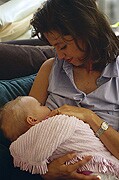- Could Your Grocery Store Meat Be Causing Recurring UTIs?
- Are You Making This Expensive Thermostat Error This Winter?
- Recognizing the Signs of Hypothyroidism
- 10 Strategies to Overcome Insomnia
- Could Artificial Sweeteners Be Aging the Brain Faster?
- Techniques for Soothing Your Nervous System
- Does the Water in Your House Smell Funny? Here’s Why
- Can a Daily Dose of Apple Cider Vinegar Actually Aid Weight Loss?
- 6 Health Beverages That Can Actually Spike Your Blood Sugar
- Treatment Options for Social Anxiety Disorder
Breast-Fed Babies May Be Smarter, Richer Adults, Study Suggests


Breast-fed babies may be smarter, better educated and richer as adults, a new study by Brazilian researchers suggests.
“Breast-feeding is associated with improved performance in intelligence tests at age 30 and also has an important effect on a societal level by increasing educational attainment and income in adulthood,” said lead researcher Dr. Bernardo Horta, of the Federal University of Pelotas.
“Taking into consideration these long-term benefits of breast-feeding as well as its short-term consequences, it is important to get more women to breast-feed their infants,” he added.
The study was published March 17 in The Lancet Global Health.
However, one baby doctor not involved with the study said it’s impossible to prove that breast-fed babies grow up to be smarter, more successful adults.
And Erik Mortensen, author of an accompanying journal editorial who’s with the department of public health at the University of Copenhagen in Denmark, said the study only shows an association between breast-feeding and IQ, not proof of cause and effect.
But the link is very strong, Mortensen said. “It may not be a causal effect, but in my judgment, the overall evidence from other studies and the Brazilian study suggests that the effects are causal,” he said.
Still, it’s important for women to know that breast-feeding does not determine destiny, Mortensen added.
“Breast-feeding is only one of many factors which influence the development of intelligence. And it actually appears that factors such as parental intelligence, parental education and social class have a stronger influence on the development of offspring intelligence,” he said.
For the study, Horta’s team collected decades of data on nearly 3,500 infants born in 1982 in Pelotas, Brazil. The data included information on breast-feeding, as well as education, income and standard IQ test results at age 30.
The researchers found that infants who were breast-fed had higher IQs, more years of school and higher incomes as adults than those who weren’t breast-fed. Moreover, the longer a baby was breast-fed — up to a year — the greater these benefits, the researchers said.
For example, an infant breast-fed for at least a year had an almost 4-point increase above the average IQ as an adult. Those breast-fed for a year achieved almost an extra year of schooling, compared to participants breast-fed less than one month, according to the study. The researchers also found that income was about one-third higher than the median in participants who had been breast-fed for at least a year.
Horta speculated that breast-feeding’s impact on intelligence might be caused by the saturated fatty acids in breast milk that are necessary for brain development. He also suggested that the amount of breast milk an infant consumes may play a role in increasing IQ.
Breast-feeding was not more common among highly educated, high-income women, but was evenly distributed by social class in this study, according to Horta.
In addition, the researchers compensated for social and biological variables that might have contributed to increases in IQ. Those variables included family income, parental schooling, genes, a mother’s smoking during pregnancy, the mother’s age, birth weight and type of delivery.
Dr. David Mendez, a neonatologist at Miami Children’s Hospital, said parents should not take the message from this study that “if you do not breast-feed, your child will not be a successful adult.”
“Clearly, to tie a singular event such as breast-feeding to the future potential of an adult is problematic,” Mendez said. “This study really points out the benefits of a nurturing environment, the energy and effort that parents put into successfully breast-feeding their children, which is indicative of parents who are loving and caring. That environment will help a child to reach their full potential as an adult.”
More information
For more on breast-feeding, visit the U.S. National Library of Medicine.
Source: HealthDay
Copyright © 2026 HealthDay. All rights reserved.










